#gilgamesh : a verse narrative
Photo


Maurice Blanchot, from The Space of Literature (trans. Ann Smock) || Herbert Mason, Gilgamesh: A Verse Narrative
#'Is that the way it is with friends?'#maurice blanchot#the space of literature#ann smock#herbert mason#gilgamesh a verse narrative#orpheus#eurydice#gilgamesh#enkidu#grief
17 notes
·
View notes
Text
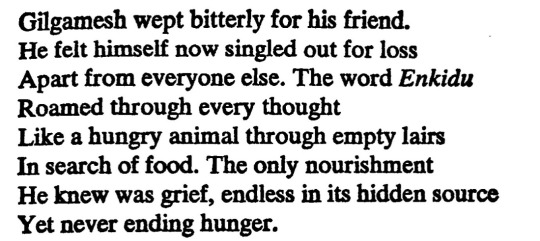
Herbert Mason, Gilgamesh : A Verse Narrative
3K notes
·
View notes
Text

3 notes
·
View notes
Text
It is the story / Of their becoming human together. 🥺
5 notes
·
View notes
Text







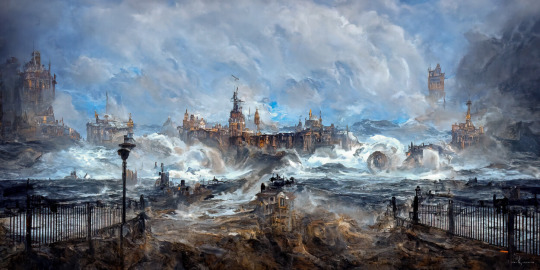



q!bad on grief
prometheus bound, peter paul rubens / why be happy when you could be normal, jeanette winterson / paradise lost, john milton / the fall of rebel angels, pieter bruegel the elder / gilgamesh: a verse narrative, herbert mason / oresteia, robert icke / sinking of atlantis, lewis skevington / the iliad, emily wilson / atlantis: a lost sonnet, eavan boland
86 notes
·
View notes
Text
I Read The Silmarillion So You Don't Have To, Part One
This is really for the benefit of my mother and sister, who are both diehard Lord of the Rings fans, but who don’t want to read The Silmarillion. My mother remembers picking it up with the expectation that it was another LotR book, and being disappointed that it read more like a history textbook than an actual novel. That’s because it’s not a novel, it’s a mythological epic along the same lines as the Homeric epics or the Epic of Gilgamesh, that tells the history of the first age of Tolkien’s world. It occurred to me that I am exactly the type of person Tolkien wrote The Silmarillion for — a person who knows folklore well enough to appreciate what he was trying to do, and recognize the conventions that he uses. I’m a person who went and applied to Yale’s graduate program in medieval studies (and got in!) just so that I could use the historical, cultural, and literary background of the Middle Ages to inform my own fiction. So, forgive me for saying it, but who’s better equipped to appreciate The Silmarillion than me? And it’s not as long as I thought, with only about 400 pages, which feels really doable after having read Jonathan Strange and Mr. Norrell. So, I’m going to paraphrase the whole of The Silmarillion, for all those who want all the juicy Tolkien lore but don’t want to read it themselves.
Before I get into it, here’s a bit of background, for those less versed in Tolkien lore: The Silmarillion is Tolkien’s magnum opus, which he spent his entire life working on and never properly finished. It could be called a “prequel” to The Lord of the Rings, but that would be misleading. It’s intended to be an original mythology for England, from before recorded history. The Hobbit and The Lord of the Rings are both small episodes from this enormous mythological cycle, and neither is really all that significant in the overall story of Tolkien’s world (which is probably why they actually got finished, and published). The Silmarillion and The Hobbit were originally meant to be completely separate projects, which is why they differ so much stylistically, but Tolkien eventually decided to combine them into the same world. The Lord of the Rings fully integrates the world of The Hobbit and that of The Silmarillion, with copious callbacks to both. (The reason Tolkien wrote it at all is because his publisher wanted a Hobbit sequel and not whatever weird thing The Silmarillion was.) The Silmarillion was not actually published until after Tolkien’s death (because he was never ready to officially declare it finished), and it was edited together by his son Christopher.
Christopher had to do a lot of reworking in order to make the narratives more fluid and consistent with everything Tolkien had written about the world. In that way, The Silmarllion kind of does resemble the ancient epics that it emulates — it’s cobbled together out of its existing material, with many pieces missing or compensated for. Christopher writes,
It became clear to me that to attempt to present, within the covers of a single book, the diversity of the materials — to show The Silmarillion as in truth a continuing and evolving creation extending over more than half a century — would in fact lead only to the confusion and the submerging of what is essential.
Like any mythology, The Silmarillion is fundamentally organic, so what Christopher did is the equivalent of taking a bunch of Ancient Greek primary sources and cobbling them together into something like Ovid’s Metamorphoses: A coherent narrative that arranges all the basic stories from the mythology in chronological order, making it much more comprehensible, but also stripping away all of its inconsistency and nuance. That actually makes it more authentic. The fact that one person was able to produce anything close to the complexity of an entire oral tradition is extraordinary.
I’m not going in blind. I have a general idea of what The Silmarillion is about, and I’m familiar with general Tolkien lore through osmosis (mostly thanks to Quora). I’m interested to see if my initial impressions hold up, how much of what I know about wider Tolkien lore actually comes from this book. I know the Fall of Numenor’s in it. Is Beren and Luthien’s whole romance in it, or is that only in the Unfinished Tales? What about Elendil and the formation of the half-elven line that would eventually end with Aragorn? What about Annatar? I guess I’ll find out.
Ainulindalë: The Music of the Ainur
In which Melkor learns that it’s really disrespectful to deliberately sing the wrong thing during a choral concert.
In the beginning there was God, whom Tolkien calls Eru or Ilúvatar. Ilúvatar creates beings called the Ainur, which are sort of like gods and sort of like angels, and tells them to sing for him. Initially, each Ainu only comprehends the part of Ilúvatar that it represents, but eventually they start to understand each other, and gradually they start to understand Ilúvatar’s big vision of the universe. They start to harmonize, and their singing creates the world. I’m only a few paragraphs in, and it’s already so beautiful I could cry.

The Music of the Ainur by Jef Murray
The first thing I’m reminded of is the Platonic (and Kabbalistic) idea of emanation — God creates higher beings that are manifestations of his thoughts, and then the higher beings create the physical world, which is a manifestation of their thoughts. Magic in general follows this same pattern of manifesting one’s ideas in physical reality. There’s so much more I could say about that, but this is meant to be a summary and not a theological dissertation. I’m betting it’s not a coincidence, though.
The Ainur are made of Ilúvatar’s ideas, and all of them express Ilúvatar’s ideas through their singing. But — oh no! — one of the Ainur comes up with some ideas of his own, and decides to sing about his own ideas in order to glorify himself. If you hadn’t guessed already, Melkor is this universe’s Satan. Just like Lucifer, Melkor is one of the most powerful and glorious of the Ainur, and he’s a Special-Chosen-One-Magical-Girl because he has a little bit of each of the other Ainur’s powers (i.e. he shares in all of their divine domains). Melkor introduces some discordant notes into his singing, which introduces imperfection to the universe.

Ainulindalë by Paontaur
Most of the Ainur who are in Melkor’s choral section are like, “who the hell is singing off-key?” But some of them like his melody better than Ilúvatar’s, and start singing along with him. This makes matters worse. Ilúvatar simply smiles and starts conducting a new song that’s similar to the first one, but a little different, to accommodate the discordant notes. Melkor and his choir start singing louder in response, and the entire universe becomes the equivalent of a gorgeous violin concerto and a heavy metal riff playing at the same time, each at full volume. To get an idea of what this might sound like, I listened to “The Cloud Atlas Sextet” and the guitar solo from “Seven Nation Army” at the same time, and… it kinda worked, in a weird way, but it definitely sounded like the two songs were competing with each other. Not easy to endure for long, so, a good portion of the Ainur stop singing.
Ilúvatar lifts his other hand, and another song starts up, interweaving with the first. One is slow and sorrowful, the other is loud and abrasive, and together they drown out Melkor’s evil guitar riff. Raising both hands, Ilúvatar ends the music in a single chord that is deeper than the abyss and higher than the sky.
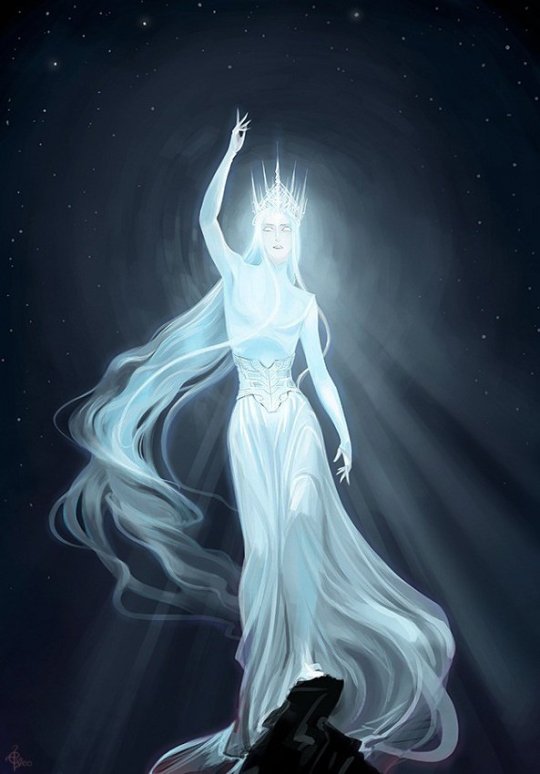
Eru Ilúvatar by Elveo
Ilúvatar addresses the Ainur, telling them that they will now see the things that were created with their music. To Melkor, he says, “If you try to change my music, you’ll find that you’ve actually made my music even better in ways that you can’t even conceive of. Everything you do is going to serve me anyway, so go ahead and try!” So, we get an answer to the Problem of Evil right off the bat. Discord is allowed to exist because, in a roundabout way, it improves the things around it. Every story needs a villain to be interesting, and Melkor is the villain of the story that Ilúvatar is telling.
Melkor feels ashamed, and then resentful. Ilúvatar gives the Ainur the ability to see (when before they were only able to hear), and shows them a vision of the world they made with their singing: Arda. Each recognizes the part of Arda that it personally sang into existence. They see some of the past, present, and future, and they also see things that they hadn’t conceived of. One of these things is a vision of the “Children of Ilúvatar,” the races of Elves and Men. Ilúvatar brought them into existence with the third song (the bombastic-sounding one), and the Ainur didn’t have any part in creating them. Most of the Ainur immediately love the people, and understand more of the mind of Ilúvatar through watching them.
Melkor and his followers, most of which are the most mighty of the Ainur, focus all their attention on Arda (as opposed to anything else in the universe). Melkor convinces himself that his goal is to help the Children of Ilúvatar in by putting the world in order, but yeah… sure, buddy. His real goal is to subdue all the Children of Ilúvatar to his own will instead of that of Ilúvatar.
The rest of the Ainur are very impressed by Arda, and especially by the sea, which contains the distant echo of the Music (which is why all the Children of Ilúvatar feel called by it). The Ainur that sang the water into being is called Ulmo (no, not Elmo), and of all the Ainur, Ilúvatar taught him the most about music. Each of the other Ainur was given a different concept to comprehend and sing into existence. The air and wind was created by Manwë, who is the noblest of the Ainu. The earth was created by Aulë, who’s almost as skilled as Melkor, but his sense of pride is in making beautiful things, instead of in himself.
Ilúvatar shows Ulmo that, although Melkor tried his best to destroy the idea of Water through his singing, all he did was make it even cooler in the manifest world. Melkor created Cold to freeze the water, but all that did was create beautiful snowflakes and whirls of frost, which Ulmo never even conceived of. Melkor created Heat to evaporate the water, but all that did was create the beautiful clouds and the music of rain falling. The clouds have the double benefit of bringing Ulmo closer to his friend Manwë (it probably says something about me that I read “thy friend, whom thou lovest” and immediately thought, SHIIIP!).
So, therefore, everything Melkor does to screw up Ilúvatar’s creation ends up improving it in the long run, and that’s why Ilúvatar allows Melkor to exist.
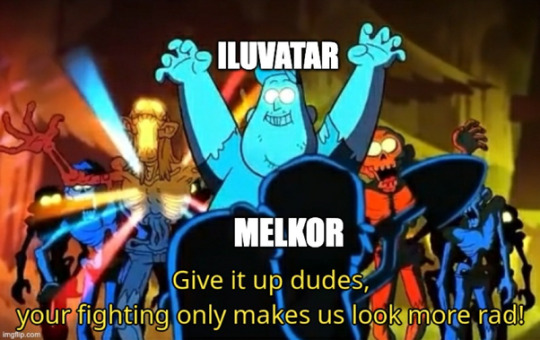
Arda does not actually exist yet, it only exists as an idea that has been described in the singing. So, Ilúvatar formally begins the manifestation of Arda with an epic Let There Be Light moment: “Eä! Let these things Be!” A light appears, and the light is the whole of the universe.
Many of the Ainur choose to remain with Ilúvatar, but a certain number of them descended into the manifest universe, Eä. Making this choice requires them to give up a significant amount of their power and ability for as long as Eä exists. That’s what being alive and in the manifest world does — it shoves you down into a smaller version of yourself and limits the things that you can do. (The Wizards experience this same thing, but on an even smaller scale.) The Ainur that decided to go to Eä are called the Valar, and they function mostly like gods and goddesses.
The Valar are disappointed to discover that the world doesn’t actually exist yet. The singing just conceived of it as an idea, and Ilúvatar kickstarted its manifestation, but now the Valar have to actually build it. So, they begin to painstakingly shape the primordial matter of Eä into Arda, the world as we know it. Manwë, Ulmo, and Aulë do most of the work, but Melkor is there too. Melkor is that guy who doesn’t actually help with the group project, but then takes credit for the whole thing once it’s done. While the other three are building the world, he offers unhelpful suggestions and changes things to make it suit his own vision. When Arda is young and covered in fire, Melkor figuratively plants a little flag on it and names it Melkor-land. Manwë, who was the lead singer of the second melody that Ilúvatar created in response to Melkor, is really pissed off and brings a host of other spirits down to Arda to kick Melkor out. No one gets to claim credit for a group project that everyone else worked on! Melkor goes off into a corner to sulk, and leaves Arda alone… for the time being.
The rest of the Valar give themselves physical forms. Because they’re all excited for the arrival of the Children of Ilúvatar, they base their appearances on the Elves and Men. Their humanlike forms, gender, and so forth are about as inconsequential to them as our clothing is to us, and they don’t always bother to “wear” their humanoid forms. Melkor sees them walking around on Arda in these beautiful forms that emulate the people and the elements of the world itself, and is even more resentful than ever. So, he gives himself his own physical form, and because he’s motivated by spite, his form is dark and scary instead of bright and beautiful. He appears as something like an ice-capped volcano, all fire and ice, striding through the sea.
What follows is the first war between the Valar and Melkor. The Elves don’t know very much about this, so, little of it is recorded. What we know is that Melkor went around and petulantly undid whatever the Valar were trying to do, like your annoying sibling who keeps knocking down your tower of blocks every time you finish building it. Whatever the Valar tried to make, Melkor would destroy. If the Valar made a valley, Melkor inverted it into a mountain range. If they carved out an ocean, Melkor “spilled” it. Everything in the world is therefore corrupted or somehow altered by Melkor, instead of matching the Valar’s original idea for it, but in the end the group project is finished and it comes close enough.
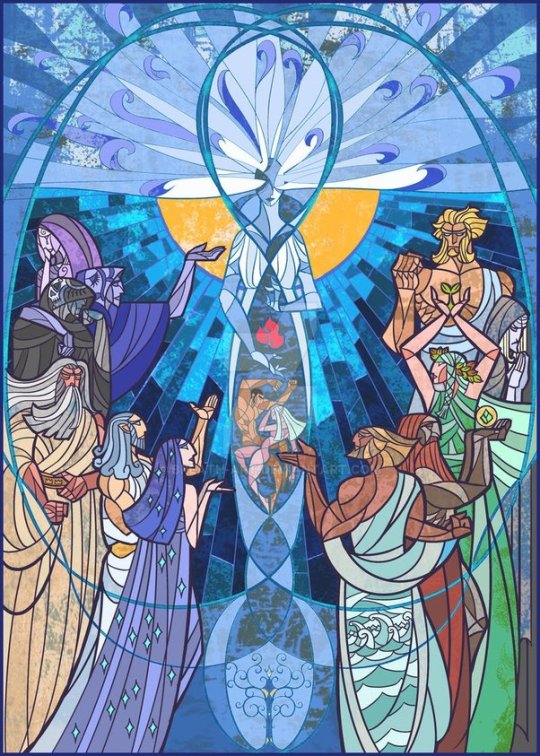
Music of Ainur by breath-art
Valaquenta: Account of the Valar and Maiar according to the lore of the Eldar
In which we’re introduced to the T̶w̶e̶l̶v̶e̶ ̶O̶l̶y̶m̶p̶i̶a̶n̶s̶ Kings and Queens of the Valar, and the Maiar.
This is what every fantasy writer wishes they could do — just exposit on the lore of their gods! I wish I could explain all about my fictional gods and how cool they are at the start of my novels, but I’m not Tolkien. Maybe someday I’ll be famous enough that someone will buy a book like this one that consists of nothing but lore.
Now, imagine that you’re opening the D’Aulaires’ Book of Elven Myths, and reading about the great elven gods (or more specifically, the gods as the Elves know them).
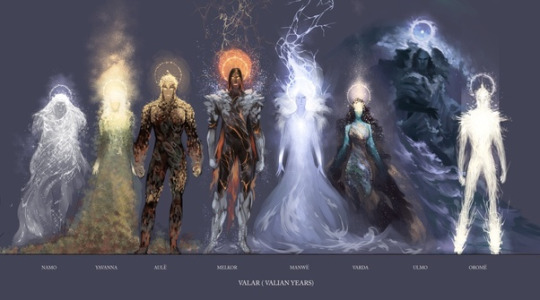
Valar by @phobso
As I usually do with pantheons of gods, allow me to introduce you to the pantheon of Arda! These are the Kings and Queens of the Valar, and there are seven of each:·
Manwë: The god of the sky and wind. He’s the High King of the Gods, just like Zeus. He has the epithet Súlimo, “breather.” Manwë sort of replaced Melkor as the Ainur who best understands Ilúvatar (making him roughly equivalent to the Archangel Michael, if Melkor is Satan).
Varda: The goddess of stars and light, Manwe’s wife. She lives with him in a tower on top of the tallest mountain (Taniquetil), and Being with each other improves their perception, so that they can see and hear everything. Varda hated Melkor before everyone else hated Melkor, and thought he was an asshole even before the Music was sung. The Elves call her Elbereth, and she’s their most important goddess.
Ulmo: The god of water, all water. He spends most of his time in the depths of the ocean, so he doesn’t see the rest of the Valar much and doesn’t bother to take on a human form most of the time. When he does, it is terrifying to see his gigantic form rise out of the waves and hear his voice, which is as deep as the ocean. Despite having disengaged from the other gods, he still loves the Elves and Men. He keeps tabs on them through all the freshwater rivers, lakes, springs, and fountains. Sometimes he wanders on shore in disguise and plays horns made of white shells, which fill whoever hears them with a longing for the sea (like Legolas).
Aulë: The god of rock and metal, precious stones, mountains, smithing, craftsmanship, and terrain. Aulë is the most similar to Melkor in temperament, because both wanted to make things of their own and have others praise them for it. It was mostly Aulë’s job to fix whatever Melkor broke during the creation of Arda, so he hates Melkor as much as anyone else. Melkor, meanwhile, lost his ability to create anything of his own — he can only corrupt or destroy things that others have made, so he especially envies Aulë.
Yavanna: The goddess of nature and agriculture, Aulë’s wife. She usually appears as a woman in a green dress, but sometimes she appears as a Tree of Life who connects the groundwater with the sky. She has the epithet Kementári, “queen of the earth.”
The Fëanturi: The masters of spirits, two brothers who rule over Death and Sleep. They’re called Mandos and Lorién, but these aren’t their actual names—they’re the names of the places they live. Their actual names are Námo and Irmo. (I’m not really sure why they were introduced to us by the names of their domains, but linguistics is weird, and Tolkien fully replicated its weirdness.)
Namó/Mandos: The god of the dead, who lives in the Halls of Mandos, in the far west of Valinor He forgets nothing, knows everything, and knows the fates of everyone. It’s his job to pass judgement upon the beings that live in Arda after they die (or… whatever the elves have instead of death? A sort of purgatory), and he works under Manwë’s authority.
Irmo/Lórien: is the god of dreams, who lives in the gardens of Lórien (now you know where the name “Lothlórien” comes from). The Valar often take breaks in the heavenly world of Lórien whenever Arda becomes too much from them.
Vairë: “The Weaver,” the goddess of history, who records all of time in her webs. She’s Namó’s wife, and lives in Mandos with him.
Estë: The goddess of sleep and healing. Like her husband, she is gentle, refreshing, and not at all like Morpheus.
Nienna: The goddess of sorrow and grief. She mourns incessantly for everything Melkor has ever done, and everything that was hurt or lost as a result. On the slightly brighter side, she’s also the goddess of compassion and hope. She lives even further west than Mandos, and the spirits trapped in Mandos supplicate her for her wisdom. She is Namó and Irmo’s sister.
Tulkas: The god of strength and heroism, who came to Arda specifically to help the other Valar fight Melkor. His epithet is Astaldo, “the valiant.” He has long golden hair and a golden beard, doesn’t need a horse because he can outrun everything, and mostly just punches stuff.
Nessa: The goddess of speed, Tulkas’ wife. She likes running and dancing, and deer follow her everywhere she goes.
Oromë: The god of the hunt and Nessa’s brother. He prefers to stalk around Middle-earth, hunting Melkor’s minions, rather than to live in Valinor with the other Valar. His horse’s name is Nahar. He has the epithet Aldaron or Tauron, “Lord of Forests.” He has a magic hunter’s horn that sounds like the sun rising or like lightning.
Vána: The goddess of youth and flowers, Yavanna’s younger sister and Oromë’s wife.
The influence from the Olympians is obvious, but this little section hints at a lot more depth and complexity in each of these beings (well, the male ones, and about half of the female ones). I’m really interested to see how they develop from here.
In addition to the Valar, there are spirits called the Maiar, which are “of the same order as the Valar but of less degree.” I suppose that means that they’re also Ainur? It’s hard to tell, but regardless, they’re the direct underlings of the Valar and they act as intermediaries, so, we could call them lower-ranking angels. There isn’t any specified number of Maiar, and most of them don’t have names. A handful of them do:
Ilmarë: Varda’s lady-in-waiting.
Eonwë: The herald of Manwë.
Ossë: One of Ulmo’s underlings, the spirit of stormy and choppy seas, who lives near the coasts of the ocean.
Uinen: Ossë’s wife, the spirit of calm seas, who protects marine life. Sailors pray to her to calm the waves, and her hair spreads throughout all the waters. Numenoreans in particular worshipped her. Ossë very nearly joined Melkor, but Uinen prevented this.
Melian: A handmaiden of both Vána and Estë, who lives in Lórien and tends the trees there. She’ll be important in Quenta Silmarillion.
Olorin: Another Maia who lives in Lórien, but he spent a lot of time with Nienna, who taught him compassion and patience. This made him the wisest of the Maiar. He’s not important to this story, but he is important to another story that you already know…
Then of course, there’s Melkor. His name means “who arises in might,” but because he’s evil, he doesn’t deserve to have this name. Instead, the Elves called him Morgoth, which sounds a lot scarier. Because he has some of the powers of all the other Ainur, he can affect all of their creations, but because he’s evil, he can’t do anything with them other than distort and corrupt them. Because he’s arrogant, spiteful, and fixated on ruling the world, this is all he ever does.
Melkor also has Maiar servants among his followers, whom he turned evil; they became fiery demons that the elves call “Valaraukar,” but that we know better as Balrogs. Most of Morgoth’s Maiar don’t have names either, but one of them does. His name is Mairon, which means “admirable,” “excellent,” or “precious.” He was originally one of Aulë’s Maiar, but left his service to join Morgoth, becoming only slightly less evil than Morgoth himself. The Elves decided that he also didn’t deserve his name, and called him Gorthaur the Cruel, or else a name that means (roughly) “abhorred” or “vile” — Sauron.
More to come!
#the silmarillion#silmarillion#tolkien#jrr tolkien#the lord of the rings#lotr#eru iluvatar#melkor#music of the ainur#ainulindale#valaquenta#valar#summary#silm#the silm#silm art#silm fanart
146 notes
·
View notes
Note
hi love, could you make a web weave about grief?


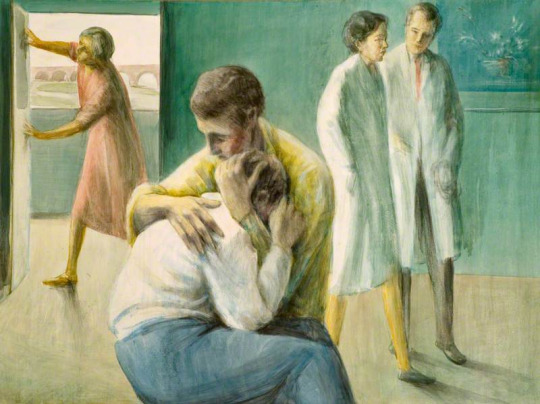
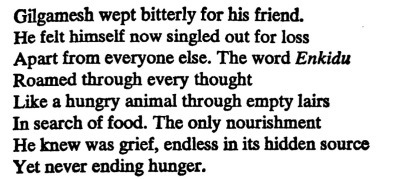





fortesa latifi the truth about grief (via @virginiewoolf) \\ patricia traxler naming the fires: "last hike before leaving montana" \\ carmel cauchi the touch of comfort \\ herbert mason gilgamesh: a verse narrative (via @saintsebastiensbf) \\ janelle rainer dead head \\ camille rankine incorrect merciful impulses: "the increasing frequency of black swans" \\ linda bierds flight: "wonders" \\ edvard munch death in the sickroom \\ kristi dilallo the language of grief: how art can provide us with different languages for discussing loss
kofi
#asks#anonymous#on grief#mine#my webweaving#webweaving#web weaving#webweave#web weave#web#webs#ww#parallel#parallels#parallelism#compilation#compilations#intertext#intertextuality#comparative#comparatives#fortesa latifi#the truth about grief#grief#mourning#on mourning#patricia traxler#naming the fires#last hike before leaving montana#carmel cauchi
143 notes
·
View notes
Text



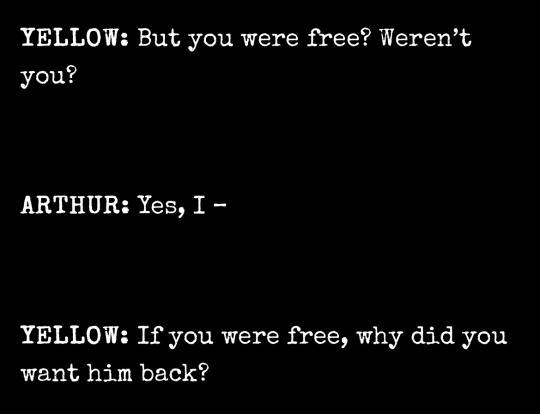




“Gilgamesh was called a god and man;
Enkidu was an animal and man.
It is the story
Of their becoming human together.”
Herbert Mason’s Gilgamesh: A Verse Narrative + Malevolent
#id in alt#malevolent#malevolent spoilers#had to limit myself quote-wise before I put approximately half the story in this post#anyway this show is making me very ill go listen to it
153 notes
·
View notes
Text



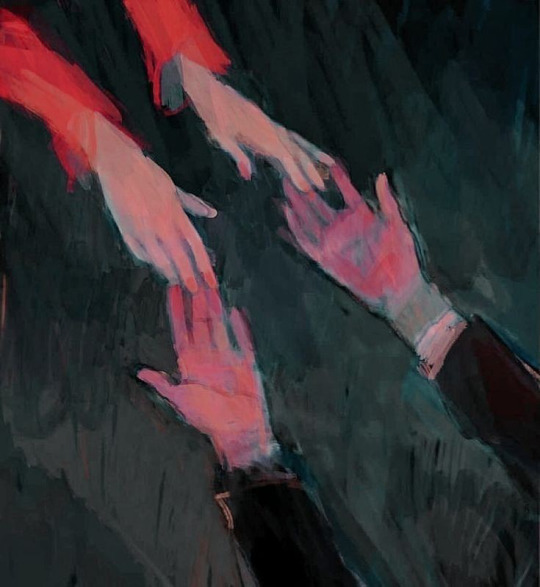

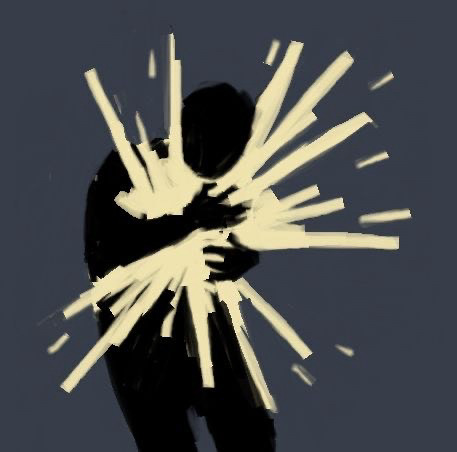

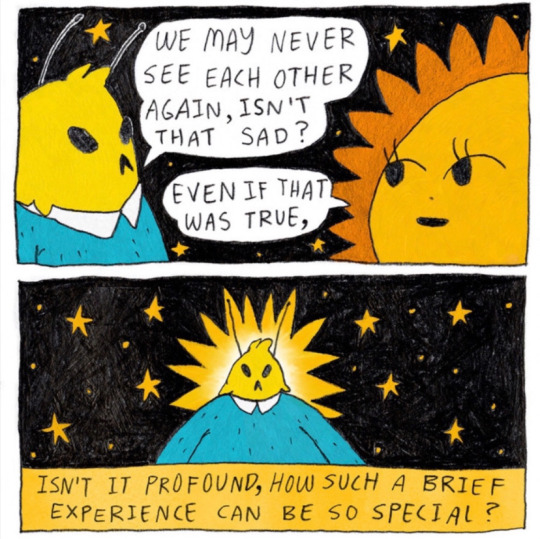
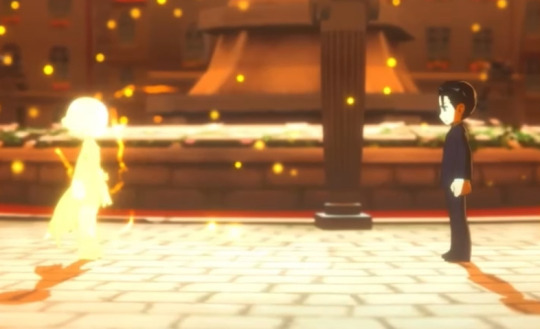

will you watch over me? (toshiro & erina)
margaret atwood // “epiphany about love and personhood”@/billypotts // everything everywhere all at once (2022) // “making amends- panel 2” by holly warburton // “gilgamesh: a verse narrative” (tr. herbert mason) // @/soapstore //euripedes (tr. anne carson) // allison zai // persona 5 tactica (dev. atlus west) // “lighthousekeeping,” jeanette winterson
#persona 5#persona 5 tactica#p5t spoilers#toshiro kasukabe#erina#i sure hope i dont have to say this but… NOT ship?? ITS PLATONIC THEYRE THE SAME PERSON!! ITS JUST A SPECIAL BOND!!!#anyways <3 dont mess with tactica fans there are 5 of us#i will do ANYTHING but draw. 💀 la la la la la la#web weaves
41 notes
·
View notes
Text











What is grief, but love, persevering? (Or whatever that marvel movie said)
Stephen Dobyns / Gilgamesh: A Verse Narrative, Herbet Mason / Liminal beach vibes, lucylyall / C!Wilbur Tribute, @revivebur / Unnamed, vampireslime10 / shitty notes-app poem, me
#web weaving#this is so silly :]#dsmp#cwilbur#this is what happens when tntduo is losing in the polls everyone#my webs
80 notes
·
View notes
Text



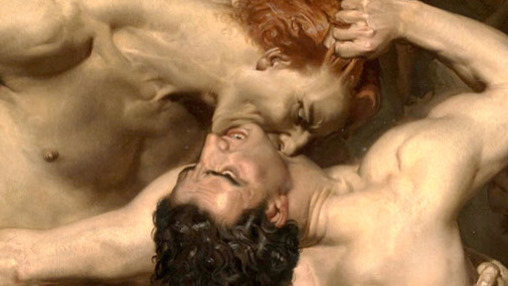


It is the story
Of their becoming human together.
[ Herbert Mason, Gilgamesh: A Verse Narrative (1971), AMC's Interview With The Vampire (2022-), William Adolphe Bouguereau's Dante and Virgil in Hell (1850), NBC's Hannibal (2013-2016) ]
#sorry guys but what if i made another one#and this one was worser#comparatives#iwtv show#iwtv#hannibal
238 notes
·
View notes
Text
Here’s something that’s probably not clear to most people who start engaging with mythology- most of the stories you will see presented as mythology are literary forms of myths, but not “myths” themselves, because a myth is not a concrete physical object like a text, a myth is a component of folklore that exists in mostly fluid ways, just like any other component of folklore. It’s made up of a space that sometimes is the overlap between what people’s individual expressions of a relevant narrative or belief are, and sometimes is the union of all these expressions, and sometimes is in between them.
So when you look at, say, the Iliad, you are not looking at the myth (or legend) of the Trojan War, you are looking at a literary presentation of a long-form poem in epic verse that is part of the mythology of the Trojan War, which presumably has lost oral sources, and may have had other contemporaneous textual sources now lost, and incorporates many other fragmentary or known sources, But the myth of the Trojan War could never be presented as a single narrative, because it branches and varies in ways that prevent it from ever being presented in such a fashion (just think about trying to present Aeneas and you’ll hopefully see what I mean).
It is also worth emphasizing that myths are by no means necessarily monocultural- many people have contributed to the Trojan War myth across a variety of cultures, and even if we only limit ourselves to people who believe it was a historical event, that still holds true as a common belief into the 19th century. The Gilgamesh mythology is presumably Sumerian in origin (it is genuinely agreed there was a historical king of Uruk with that name who became mythologized), but the Epic of Gilgamesh is in Akkadian and only appears to begin taking form some 300-400 years after the Sumerian-language Bilgamesh poems, and the mature form you might have read or know about is thought to have been composed at some point in the period from 1300-1000 BCE, possibly as many as 1900 years after the historical Bilgamesh may have lived and reigned, and certainly closer to a thousand years after the first recorded Bilgamesh literature.
Gilgamesh mythology was still active in the days of Roman and Sassanian rule, which extends things another millennium and a half, perhaps. Quite a long period for the Gilgamesh myths to form under.
311 notes
·
View notes
Text
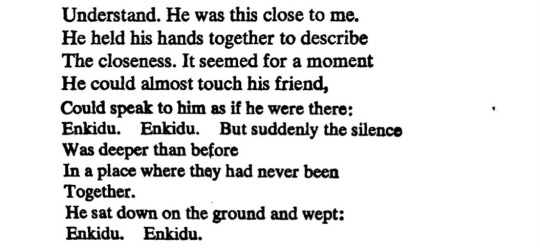
Herbert Mason, Gilgamesh : A Verse Narrative
#oh my fucking god the repetition of his name gets me every time#quotes#herbert mason#gilgamesh#gilgamesh : a verse narrative#enkidu#grief#friendship#loss#repetition#silence
2K notes
·
View notes
Note
🖊 + Maru!
Send me a “🖊+an OC“ and I will talk about that OC! It can be a headcanon, a fun fact, a small paragraph of backstory- anything!
Alternatively, send in just a “🖊“ and I will talk about any one of my OCs at random!
Oh, Maru my beloved.
Maru "Maru-Maru" Maru is my character in Secret World Legends and my NPC (and eventual PC) for the Secret World ttrpg. They are the current OC im constantly rotating in my brain like a rotisserie chicken.
I had attempted to write a longer form comic for them and even finished a first chapter. Unfortunately, life got busy and started taking more spoons to other tasks and I am not able to dedicate the time and energy I want to the comic. And thats okay. In the year I have been cold, I have expanded upon the Maru-verse even further, and discovered even more interesting loops and details to incorporate. And I cannot wait to illustrate them one day.
So without further ado, please enjoy this extensive lore breakdown on Maru-Maru:
For your convenience this post has a keep reading <3

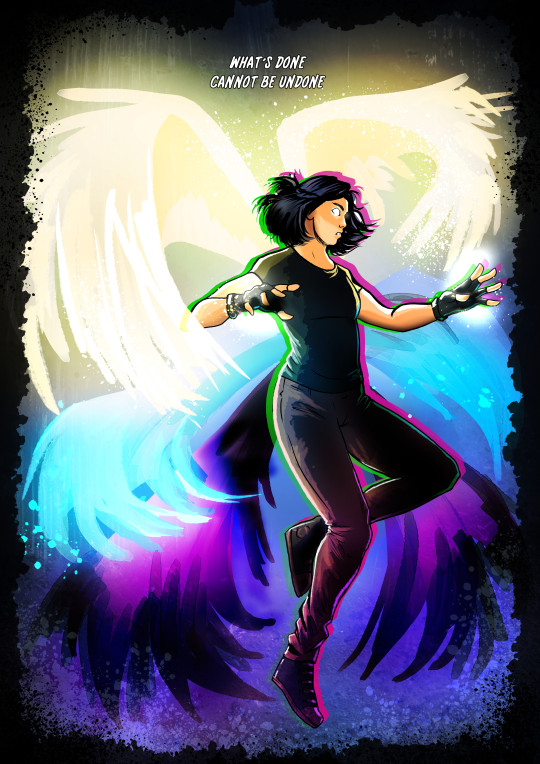
Name Significance: Of course Maru is not their given name. Its partially a joke, partially an echo of a long-lost memory, partially a misheard role to fulfill, and their first grasp on their identity.
The name Maru firstly comes from my Exalted Zenith character. My partner and I wanted to name our bees after them, as a way to honor the fun we had with such a short campaign. Little did we know how smoothly Exalted and SWL can blend together- the transition from one age to the next, apocalypses rising, and powerful beings beyond comprehension changing Creation. The tone is certainly different though: an Exalted chronicle is uplifting and with epic heroes to save the world, whereas SWL is riddled with uncertainty about how long the collective will of reality can hold.
The SWL version of Maru can barely remember their previous incarnation, it's more like a weird dream than anything else. If they look to closely, the memory vanishes; like the people of the Third Age trying to grasp their memory of the Second, and their predecessors before them. The golden light within them feels different, yet can still vanquish monsters with their touch, and aid people plagued by nightmares seeping through cracks in reality.
A more recent discovery has played nicely into my friends headcanons and names of their characters. SWL Maru was discovered by experienced agents of names Inanna and Ninshubur in Kingsmouth. While the name Maru is not a Sumerian/Assyrian deity, Mamu is. There is not a lot written about Mamu. They are most notable for being a god of dreams and having both male and female depictions. We love a lil gender fuckery in the pantheon. There was temple built in Imgur-Enlil (modern Balawat) to them. Dreams were not seen as depictions of the subconscious (thanks Freud) but rather true portents of the future. This is all over the epic of Gilgamesh as a literary device to keep that long ass story going. Regardless, the Assyrian King who had dreams of Inanna vanquishing his enemies felt the portents were significant enough to build that temple to the messenger: Mamu. Additionally, there are oodles of accounts of death-dreams and glimpses into other worlds (namely the Underworld) across several sites, whether its recorded dreams from priests and priestesses- or more Enki myths.
And this is what Maru does- even by accident. They catch glimpses into the other worlds, talk to other versions of themselves to relay messages and warnings, and make sure Inanna and Ninshubur are aware of whatever weird shit is out there. In the SWL ttrpg, I intend to have Maru explore this role to fulfill more, as a messenger and a dreamer. Funnily enough, the surname I gave Maru is 夢宮: Yumemiya, which can translate to Yume: dream, and Miya: a shrine, or place for gods. Don't you love it when the narrative falls into place like that? (But in truth, I borrowed the surname from Kanae Yumemiya, an actress who portrayed Usagi in a Sailor Moon Live production...)
Lastly on name significance, we have the japanese translation that Maru means ◯, and is literally a circle. Depending on the characters used to spell Maru, it can also mean truth, and expanded to mean a complete unending cycle. Putting two ◯◯ together is like censoring a name or word, similarly to how $#%&#! is used in English. In a way, Maru-Maru is saying their name is Redacted, or blankety blank or So-and-so. This was incredibly hilarious in the SWL game when QBL labels the player a terrorist after climbing Orochi Tower. Ah yes, you've definitely found the ringleader who set off the Tokyo bomb: It was ◯◯! Excellent journalism, QBL, no notes.
But in truth, its a clever and funny way to hide themself. Searching Maru on google is gonna get you a stardew valley villager and a cute, chubby cat youtube sensation. And they like it that way.
So whether it's Maru, Mamu, Redacted, ◯◯, or some other weird fifth thing, they'll always be that one odd baby bee who reaches across dimensions to keep reality running just a little longer. They won't have to face the end alone, in fact, its statistically improbable.
And if you survive. If you are still you. Think on the questions. Remember when you were a bright little thing, so full of questions?
THE LIFE CYCLE:
Time is a funny thing when dealing with several versions of the same individual. The smallest changes completely alter a course of events. Many Marus recall gaining their bee not long after the Tokyo Filth bomb around 2012, and being swept up by whichever agency got to them first. Many recall their parents working tirelessly at their jobs at the Orochi Group. They learned how to cook for themself at a young age because Mom and Dad wouldn't be home til late. Many recall the first time they heard the buzzing static was as young as 6, following the sweet whispers through a soon-to-be park and a newly planted flowering tree. There are a few that never receive a bee, or receive their power through other means. These timelines are the strangest ones.
A riddle to kill a sphinx: What's one, then three, and then one again? Wait- that's not how it goes...
The Lumie, Templar, and Dragon Maru all share the same origin. Depending on where an outsider glances, the three realities are so close, they are nearly one. Nearly. They grew up in Kaidan with their parents. They did attend the Orochi-sponsored schools and attended several programs, but flew right under the radar for "gifted abilities" that Orochi was seeking. Little Maru was aware of whispers in tv static, rattles in old pipes, the shrieks of summer cicadas Evangelion style. As a young child, they marched to the beat of their own drum, ignoring or indulging the whispered warnings as they saw fit. The dreams were harder to ignore, but when they told their parents about the big scary monsters that couldn't get out- it was written off as their overly active imagination. After all, they had failed an aptitude test to get into the nearby elementary school near their work. Its uncertain whether or not Maru's parents knew what that test was truly analyzing- and whether or not they were relieved to see they failed. Decent Orochi employees have excellent poker faces.
Sometimes one is born special. Sometimes specialness is genetically modified into one. Not every child is equal.
As they grew older, the supernatural continued to burrow into their eardrums. Maru was an average student, but occasionally received top marks on answers whispered to them. They earned a reputation for being a little bit of a tech whiz, and had an observant eye for finding errors in codes. Not really a "super power" but troubleshooting tech is an immensely useful skill. Maru was exceptional at the ol' percussive maintenance with old printers, punchcards, and fax machines. When things went to digital interfaces, Maru found the tried and true "have you tried turning it off and back on again," to be a real winner.
When they didn't want to hear the whispers, they'd make use of bulky, noise-cancelling headphones. Maru would often be seen wearing them outside of class and in their home, enjoying the peace and quiet. Maybe the headphones were a placebo. It only worked because they believed it worked. However, at night, their mind would be plagued with vivid dreams and even louder whispers and messages. Headphones can't keep hide the noise if its already in their head. Frustratingly, they'd always wake up and immediately forget what they dreamt. This was their normal. Caffeine to keep themself up during the day, wear headphones to keep out the messages, and TV to drown out the static at night.
And there wasn't really anyone to talk about it with. Last time some Orochi kid fessed up to their weird dreams and whispers, he'd definitely vanished. Teachers said the student moved away, but Maru knew his parents still worked in Faust upper management. Another girl said she could hear thoughts before you could finish thinking them. Maru thought that one was bullshit- but she disappeared too. Lesson learned. Keep the static to yourself.
Don't fear It. Fear Nothing. Fear the Foundation. It's no wonder; they say once you hit four, it's all downhill from here.
When it came time to apply for highschool, a few of their peers found this "Clubhouse" and despite its messaging, were blabbermouths about it. Maru always felt uneasy about the place. If there were whispers saying they had nothing to fear, they didn't trust it. They couldn't believe the claims that were coming from this place. Free drinks? Can play games as long as you want? You can be yourself without any fear? Maru especially didn't trust the last one. None of their classmates knew how they felt wearing the girls uniform. None of them knew how exhausting it was to shut out the whispers, keep the eyes on them sated with just the right expectations, and then complete their coursework on top of it all. Maru absolutely did not want to "perform" there either.
Upon finishing highschool, Maru was presented with an opportunity. They'd complete a university comp-sci degree and then immediately dive into a job at the company. Orochi is not devoid of nepotism. At first, this seemed ideal. They'd attend university in New York, and take their summer internships with the American branch of Orochi. Should everything go well, which... it was going to go well that was the expectation... they'd be looking at a substantial salary and generous benefits while working in the Tower.
America was loud. America is loud. But the sheer volume of everything drowned out the buzzing whispers. They still needed the headphones to drown out the rest of the noise though. They could focus a lot more on themself outside of the Orochi bubble, even if their presence was just a few streets away.
Maru figured out a lot about themself in the four years at Uni, especially the gender thing. They enjoyed building weird robots and programming them to do silly things- in addition to their assigned tasks. They enjoyed the few college parties they attended. They even had a steady, long term relationship with a classmate named Caesura (nods back to Exalted). As graduation loomed, they dreaded going back home. They realized how much time they spent alone and really did not want to go back to that solitude at Orochi. So they avoided it. They delayed their graduation by a year and a half by swapping majors, making absurd connections and promises with subdivisions of Faust and Anansi, and prolonging which classes they needed to graduate.
What was the cause of all this, sweetling? Where is the zero point?
Everything changed sometime in 2012. Maru couldn't get anyone on the phone back home when the bomb went off. Even the work lines in Faust were gunked up. They have zero clue if a letter they wrote made it through security and into Orochi's headquarters. Caesura had also vanished. (Unbeknownst at the time, the man was abducted by the Dragon. In most timelines, he does analog calculations for the faction, figuring out where pieces need to move rather than doing field work himself). And then they get their bee, freak out and wreck their apartment, get nabbed by one of the big three, and then get sent out to Kingsmouth.
Things start to break and differ sometime after this for our Red, Blue, and Green iterations of Maru. They all admit to being unaware of their prowess for chaos magic before meeting two other big bees: Ninshubur and Inanna. It was Ninshubur who gifted the confused baby bee a chaos focus, and Inanna gifted a them an empowering gadget. Receiving these items are one of the more prominent cracks on the flickering timelines on the Reality Engine.
Though the most prominent tears in their time are when the Dreamers made themselves known to Maru. The first, a gift. The second, worship. The third, freedom.
Templar!Maru, believes they were tricked by the gift. They swear they would have never have listened to the bubbling voices, but deep down they know that they fell for their sweet words. Whenever the Dreamers approached them, they were certain to make sure they'd never be fooled twice. Their choices are marked with unbound Blue wings.
Dragon!Maru had already begun developing their philosophy on the cyclic end of the world: however messy and destructive it was going to be, whatever was going to rise out of the ashes was going to be just as magnificent. Decay is a form of life. They morbidly want to see what the world will look like at the end, but have to be strong enough to make it there. Accepting the gift, begrudgingly worshipping, and freeing the Dreaming Ones is all part of their dream. Their wings drip with filth. Unease sits in their stomach, they do not know if they'll get their wish.
Lastly, Lumie!Maru was keen on not listening to more voices in their heads. They are the only iteration to refuse the gift. Their wings gleam gold. What is done cannot be undone, and they loathe that their defiance to one set of voices is obedience to another.
Go ahead, glance back. Don't sweat it, sweetling. You won't turn to salt and you can't make yourself impossible. History will conserve itself. The continuities will hold.
Again, time is funny when dealing with several iterations of the same individual. The slightest changes make immense impacts on their lives. There are Maru's who graduated on time. There are Maru's who never left Kaidan. These individuals work with Orochi, whether they want to or not. There are Maru's who's last memory is the filth exploding from within that guy's jacket. There are Maru's still sleeping. There are Maru's who joined the Council of Venice, there are Maru's who hacked the Swarm's game back, and fled their factions. There are Maru's who want nothing to do with the secret world and just want a peaceful goddamn life with their wife and accounting job. There's a Maru who is just really into boats...
But they are all connected, tethered to one another. Like a rat king on reality, fated to meet and tangle.
FUN and STRANGE DETAILS:
BLOODY VALENTINES: Uta, the rabbit killer in Kaidan, is three separate individuals who used to inhabit the same body. Lilith is responsible for splitting her like a worm and separating the sibling souls into new bodies. Maru is an anomaly: they are physical duplicates of the same individual existing simultaneously. Both Maru and Uta fight with unprecedented coordination, switching aggro and balancing their buffs between the three of them. The showdown at the top of Orochi tower was certainly a spectacle... And a vocabulary lesson for swears in several languages. Some agents have noticed the similarities between Maru and Uta, but Maru is quick to squash any speculations. This is not because the two actually know each other, but more Maru does not want anyone to know their Orochi background if they can help it.
The buzzing on Uta reveals some interesting clues about Maru and their existence. Uta was not plagued with insanity but rather hypersanity for the new age- and with new software there are bound to be bugs. While Maru didn't absorb their twin in the womb or was misdiagnosed with schizophrenia; Maru was also sensitive to whispers just outside reality. And so were other children born around the same time. Maybe Maru and that generation of kids got the patched version.

A LUCID DREAM: The Black Signal, or John, tells the Chuck's who will listen that he's no longer singular, he is plural- but remembers what it was like being a sole individual. To Maru, this is so old news. In fact, Maru loves to snark back at him saying that he is not special and they're plural too. There are many Maru's. The Black Signal doesn't really tend to listen to this. Maru may be many, but Maru is still meat. If they would hatch, then they'd have a new conversation. Again, Maru disregards this, and says they've spent enough time being an egg.
They don't want to think too hard about what it means to have "hatched." They know John's not talking about them being nonbinary. Maru is an adept and experienced enough chaos user at this point to recognize when a timeline is too different for them to safely pull on. There's a phantom pain in their outreached hands and fingers when they try to go too far. They are aware that there are some selves they used to be able to call upon and cannot anymore. Something about them has changed. They are aware they can become "out of sync" with their doppelgangers or even be "out of phase," and get stuck somewhere overlapping two or more timelines. But to not be able to call themself at all is terrifying. If only they had the ability to glance at all it all from the outside ... oh.
At least, Maru can't do this consciously. Some versions of Maru have swapped places with their doppelgangers in their sleep or had rude awakenings of being pried from bed to be used as a meat-shield for another. While dreaming, they can go anywhere- so long as they don't forget how to wake up. These ones don't know how close they get to bleeding out of reality.
MAKE THE RIGHT CHOICES:
In my SWL playthrough, I of course ran into a whole bunch of bugs and glitches. And I love them. But, there were times that it made the game do absolutely weird things- which provides some very fun stories to weave into the glitch. The most notable was at the Second Choice in the City of the Sun God. At this point, my partner had played ahead and was almost through Translylvania when I had finally defeated Aten. He knew there was an Ultimate Move behind the choices and spoiled a little (with my permission). I didn't know what "Blue Wings" meant but I understood to get them I would need to, against my better judgement, listen to the Dreamer's at least once. So after defeating Aten and being greeted by the Filth bird saying "hey you should do the worship emote" I then obliged and typed /worship.
And the game crashed. No worries- this happened all the time for me. My laptop would get obscenely hot running this game and would shut itself down so it wouldn't fry itself. Upon reloading, I had to do the Aten fight again but found myself having trouble with some of the UI interface. Reloadui did not solve the issue, and I found myself in front of the Filth bird again. I typed /worship and Maru did nothing. I opened the emote tab, and clicked, and Maru would do nothing. In fact, all of my emotes were not functioning- except the dances.
I laughed as I watched Maru dance and devour tacos in front of the Dreamer, not knowing how frustrating it must have been for the cosmic entity to watch some small, nascent angelic thought just proceed to do anything but what it requested. How much longer? Out of frustration, I eventually attacked the creature, triggering the next cutscene. The Dreamer's were angry, and I laughed and laughed.
Now the strangest thing is in game play, Maru sometimes has golden wings. I have had friends say they see blue wings and I will see gold on my screen. I've also had the opposite. In all cutscenes, they are blue. Considering the overlapping timelines, it seems like Lumie!Maru's almost choice bleeds through onto their timeline sometimes.

INITIATE THE D20 SYSTEM:
I have been very fortunate to be the storyteller for some very avid fans of the Secret World and have presented an alternative timeline to the world they know and love. Maru of course, is no exception to this. Everyone is operating with different times and circumstances. Eventually, I will get the chance to play Maru in the game. But for now, Maru has only made one appearance: to Olivia, the newest bee of the group. Of course, Olivia has zero idea what implications she has encountered by merely interacting with this version of Maru, untethered to their doppelgangers. The TTRPG timeline is indeed one of the strangest.
Thank you for reading this absurdly long OC lore post, I have spent easily 3 week writing and editing and rewriting and adding. I hope you enjoyed and it sparks some fun thoughts about SWL and maybe a lil Exalted. As a treat.
15 notes
·
View notes
Photo
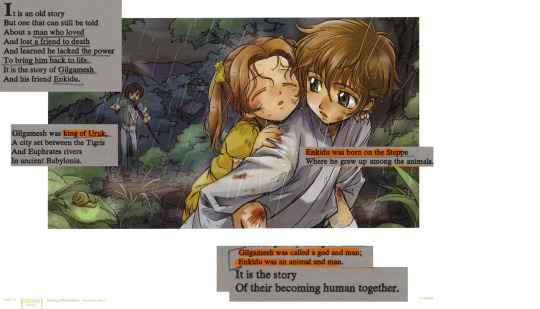

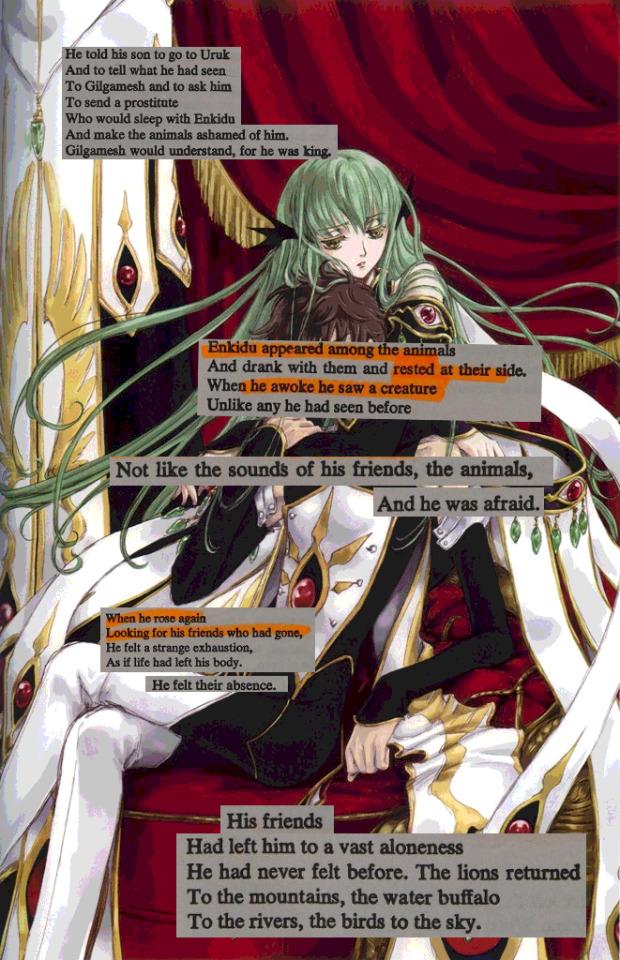

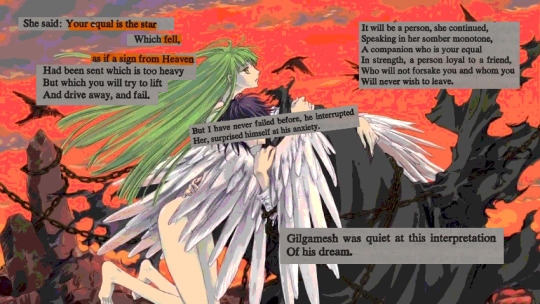

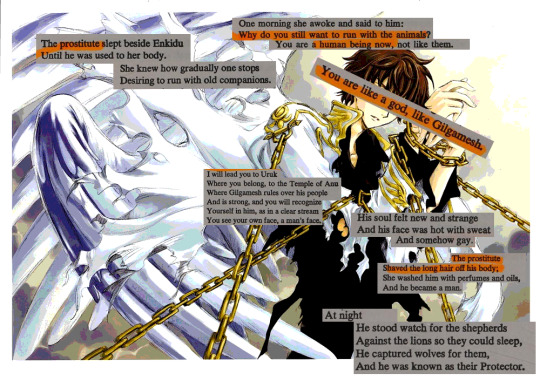
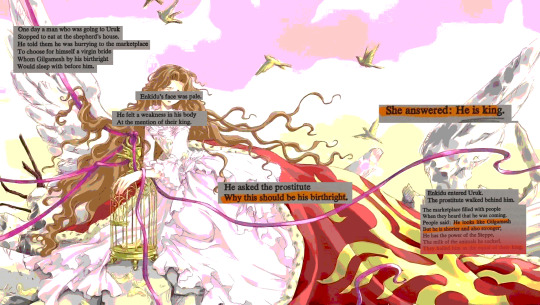
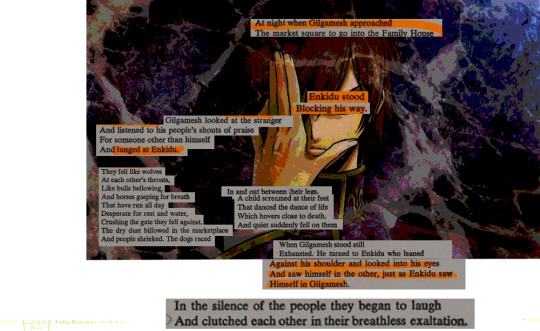
code geass x gilgamesh : a verse narrative (translation by herbert mason) (1/?)
44 notes
·
View notes
Note
1, 2, 6 for book questions!
How many books did you read this year?
159 as of today; i expect to finish a few more next week if not this weekend.
Did you reread anything? What?
sonnets from the portugeuse by elizabeth barrett browning
tlok turf wars comics
the heroes of olympus series by rick riordan
gilgamesh: a verse narrative by herbert mason
a series of unfortunate events, the bad beginning and the reptile room by lemony snicket - meant to read more, but i've been reading them out loud to my brother and it's hard to find the time
howl's moving castle trilogy by diana wynne jones
blue beetle (2006) comics by keith giffen and john rogers
uprooted by naomi novik
the odyssey (emily wilson translation)
the iliad (wilson's translation as well, which was not a reread, but i have read the iliad before lol)
selected poems by william carlos williams
earthsea series by ursula k. le guin (in progress)
collected poetry and prose by wallace stevens (in progress)
Was there anything you meant to read, but never got to?
i was going to read interview with the vampire for halloween and forgot and then halloween was over. many other things too but that one i actually feel a little guilty about
7 notes
·
View notes